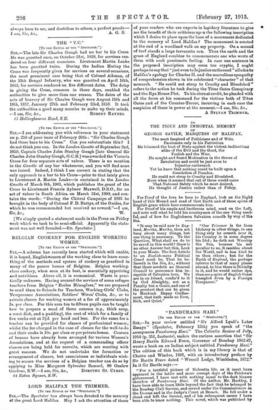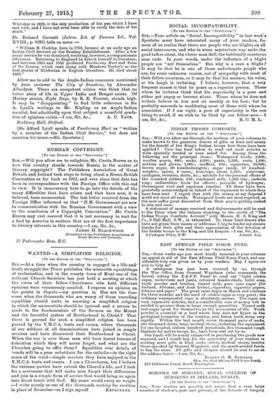"PANDURANG HARI."
[To THR EDITOR or Tn. " Srscuron.."] SIR,—In your review entitled " Sir Alfred Lyall's Later Essays" (Spectator, February 13th) you speak of "the anonymous Pandurang Hare The Calcutta Review of July, 1910 (p. 351, footnote), makes the curious assertion that "Sir Henry Bartle Edward Frere, Governor of Bombay 1862-67, wrote a book on an Indian subject entitled Pandarang Hari." The edition of this book which is in my library is that of Chatto and Windus, 1891, with an introductory preface by Sir Bartle Frere dated " Wressil Lodge, Wimbledon, 1872." In it Sir Bartle says "For a truthful picture of Mahratta life, as it most have appeared in the latter and more corrupt days of the Peishwa's government, I have met with nothing equal to the dark bizarre sketches of Pandurong Hari. Of the author, Mr. Hoekiey, I have been able to learn little beyond the fact that he belonged to the Bombay Civil Service, and served under the Commissioners in the Deccan and in the Judge's Court at Broach. He fell under a cloud and loft the Service, and of his subsequent career I have been able to trace nothing. This novel, which was published by
Whitaker in 1826, is the only production of his pen which I have met with, and I have not even been able to verify the date of his death."
Dr. Richard Garnett (Intern. Lib. of Famous Lit., Vol. XVIII., p. 8291) tells us more
" William B. Beckley, born in 1792, became at an early age an Indian Civil Servant on the Bombay Establishment. After a few years' service he was dismissed, receiving, however, a compassionate allowance. Returning to England he betook himself to literature, and between 1825 and 1830 produced Pandering Hari and Tales nj the Zerrano, which rank along with Meadows Taylor's as the best stories of Hindustan in English literature. Ho died about 1560."
Allow use to add to the Anglo-Indian romances mentioned by yonr reviewer The City of Sunshine, by Alexander Allardyce. There are competent critics who think that no better story of life in Upper India and Bengal exists. Of Mutiny stories, Eight Days, by R. R Forrest, stands high. It may be " disappointing " to find little reference in Sir A. Lyall's writings to Mr. Kipling as an Anglo-Indian novelist, but admittedly upon that subject a manifold grada- [Sir Alfred Lyall speaks of Fandurang Hari as "written by a member of the Indian Civil Service," but does not mention his name.—En. Spectator.]



































 Previous page
Previous page